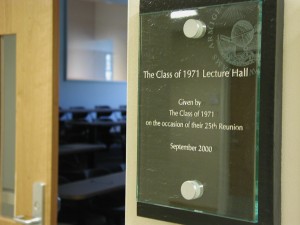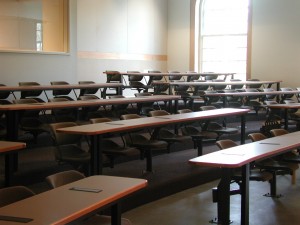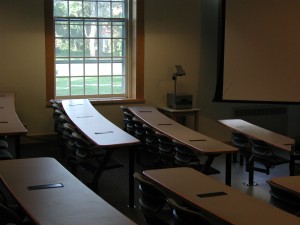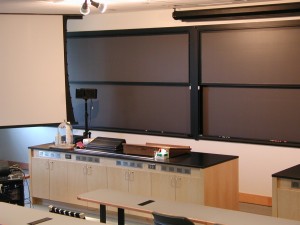For our 25th Reunion, we contributed $3 million to support three major projects: a gift to the Thompson Labs, scholarships, and a public affairs forum.
Class of 1971 Lecture Hall
As we approached our 25th Reunion, Williams was planning major renovations of the Thompson Labs, which were built in the 1890s. We secured naming rights to a large classroom on the second floor of the Chemistry building with $1 million of our gift.
|
|
||
|
|
Class of 1971 Scholarships
At the time of our 25th Reunion, endowment of a full tuition scholarship cost $460,000. For the first several years, our scholarship was awarded to male and female students in alternate years, reflecting our intention as the first class to graduate women. Over time, the size of the endowment has grown, so that we are now able to support two students, a woman and a man, each year. In proposing this project, the gift committee chairs said “We expect that, as the years go by, the expansion of this scholarship fund will serve as a continuing goal of the Class.”
As of the end of fiscal 2022, our scholarship fund was valued at $3.225 million. Through the end of the 2021-2022 academic year, this class gift has supported 49 students with financial aid scholarship with a total distribution of awards of $1.7 million.
Class of 1971 Public Affairs Forum
Recognizing that “political activism was a central experience of our era at Williams”, the gift committee chairs proposed a forum in which “future generations of Williams students will be exposed to rigorous debate which will show them — and ourselves — that persons of intellect can disagree without being disagreeable and will encourage them to consider both sides of important issues.” The Forum was funded with $250,000. The Forum continues to be relevant today; President Mandel formed an Ad Hoc Committee on Inquiry and Inclusion, and discusses their final report in a July, 2019 interview.
The Forum has sponsored and co-sponsored numerous programs:
2019-2020: A conversation on “Digital Technology, Social Media, and Today’s Political Climate” featuring NPR tech correspondent Molly Wood and Glenn Greenwald, co-founding editor of “The Intercept” moderated by Aminatou Sow, co-host of the popular podcast “Call Your Girlfriend.”
2018-2019: Roundtable discussion on “Free Speech and Intolerance” with comedian Negin Farsad, author Reza Aslan, and writer Alicia Garza, moderated by Jamelle Bouie, Slate’s chief political correspondent.
2017 -2018: A moderated conversation with journalists Farhad Manjoo and Nick Carr on the “Impact of Technology – Nationally and in the Liberal Arts.” The forum examined the ways in which technology impacts the academic world of liberal arts and the nation as a whole; and was moderated by James Nolan, Washington Gladden 1859 Professor of Sociology.
2016-2017: Forum Talks with David Simon (author and television producer) on his latest two works of narrative non-fiction, Homicide: A Year on the Killing Streets and The Corner: A Year in the Life of an Inner-City Neighborhood; Van Jones (CNN political contributor) on “Green Jobs, Not Jails”; and Maxine Burkett ’98 on “Moving Stories: Justice and the Contemporary Climate Refugee.”
2014-2015: Forum Talk with Jonathan Franzen and Andrew Sullivan on issues of national importance; moderated by Candis Smith; as well as a lecture by Eve Ensler on “Ending Violence against Women: The Next Rising Years.”
2012-2013: Panel Discussion on the 2012 Election with Russell Muirhead (Robert Clements Associate Professor of Democracy and Politics at Dartmouth College), Cathie Jo Martin (Professor of Political Science at Boston University), and Jeffrey Tulis (Associate Professor of Government at the University of Texas, Austin) and talks by Michael Beschloss ’77 on “Presidential Leadership” and Hedrick Smith ’55 on “Who Stole the American Dream.”
2011-2012: Forum Talks on Humanitarian Issues in Action with Noam Chomsky and Fiona Terry on “Getting it Right: Dilemmas in Humanitarian Intervention,” Anat Biletzki (Israeli peace activist) on “The Sacred and the Humane: Human Rights without God,” and Mike Wilson (Native American human rights activist) on “Nobody Deserves to Die in the Desert for Lack of a Cup of Water.”
2009-2010 The Future of Capitalism Series with James Galbraith—“The Great Crisis and the Dismal Science,” Richard Sennett—“Falling Behind: The Skills Economy Becomes Weak,” and James Fallows—“China Rising.”
2008-2009: Two Talks: Arianna Huffington on “The Road to 2008—Presidential Politics Today” and Jane Swift on “Lipstick Republicans and Why They Make the Left Crazy.”
2007-2008: Forum Talk on “Global Public Health” with Laurie Garret, Senior Fellow for Global Heath at the Council on Foreign Relations, and Stephen Lewis, former UN Special Envoy for HIV/AIDS in Africa.
2005-2006: Public Lectures on “Reform, Resources and Race: the Future of Public Education in America” with Dr. Rod Paige (former Secretary of Education) and “Social and Educational Equality” with Jonathan Kozol (author, educator, and social justice advocate).
2004-2005: Political Debate: “Bush or Kerry” with Dinesh D’Souza (former White House senior domestic political analyst during Reagan administration and Hoover Institution Fellow at Stanford University) arguing for President Bush and George Marcus (Williams Professor of Political Science) arguing for Senator Kerry.
Additional Discussions with Dinesh D’Souza “In Defense of the American Empire,” Thomas Kean (former Republican Governor of New Jersey and Chair of the 9/11 Commission) on “Lessons Learned: September 11 and the War on Terrorism,” and a conversation with Howard Dean (former Democratic Governor of Vermont) and Stephen Frazier ’74 (CNN Headline News anchor) on the long-term implications of the 2004 presidential election and youth involvements in the process.
2002-2003: Forum Talks with Ted Sorenson (advisor to President Kennedy), Robert McNamara (defense secretary), and James Blight (author) on the “Presidential Leadership of JFK and the Cuban Missile Crisis.” Coordinated by the Leadership Studies Program.
2001-2002: Debate on the topic of “Does the Bill of Rights protect non-US citizens?” with Nadine Stroseen (ACLU president) and Pat Buchanan (political analyst). Moderated by the Williams Debate Union.
2000-2001: Debate on “Government Funding of Religious Organizations” with John Podesta (former White House Chief-of-Staff) and Gary Bauer (former presidential candidate). Moderated by the Williams Debate Union.
1999-2000: Forum Talk with Orvell Schell (Dean of the Graduate School of Journalism, UC Berkley) on “The Future of China.” Coordinated by Marc Lynch, Political Science Department.
1998-1999: Debate on “The Future of Feminism” with Arianna Huffington (Center for Effective Compassion), Rebecca Walker (3rd Wave Direct Action), and Naomi Wolf (essayist). Moderated by Sanford Ungar.
1997-1998: Forum Talk with former New York Governor Mario Cuomo and Paul Craig Roberts, a leading contributor to Business Week and The Wall Street Journal, on “Justice across Generations.” Moderated by Neil Conan.
Panel Discussion on the topic of “What are our obligations to the elderly and to the very young, and what role should we assign to government in meeting them?” with Laurence Kotlokoff (Boston University), Michael Tanner (Cato Institute), and Joseph White (20th Century Fund). Moderated by Douglas Gollin.




